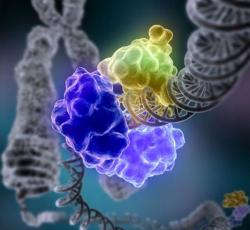 Like editors trying to improve a poorly-written book, a team of scientists deleted some ‘letters,’ and inserted others, working feverishly to recode the entire genome of an organism. In so doing, they improved a bacterium’s ability to resist viruses.
Like editors trying to improve a poorly-written book, a team of scientists deleted some ‘letters,’ and inserted others, working feverishly to recode the entire genome of an organism. In so doing, they improved a bacterium’s ability to resist viruses.
 Like editors trying to improve a poorly-written book, a team of scientists deleted some ‘letters,’ and inserted others, working feverishly to recode the entire genome of an organism. In so doing, they improved a bacterium’s ability to resist viruses.
Like editors trying to improve a poorly-written book, a team of scientists deleted some ‘letters,’ and inserted others, working feverishly to recode the entire genome of an organism. In so doing, they improved a bacterium’s ability to resist viruses.
“This is the first time the genetic code has been fundamentally changed,” Farren Isaacs, assistant professor of molecular, cellular, and developmental biology at Yale, stated in a press release. “Creating an organism with a new genetic code has allowed us to expand the scope of biological function in a number of powerful ways.” The research, conducted by scientists in laboratories at Yale and Harvard in the emerging field known as ‘synthetic biology,’ will be published tomorrow in the journal Science.
Building Blocks of Life
DNA (deoxyribonucleic acid) is a molecule that delivers (via coded message) the genetic instructions that guide the development and functioning of all known living organisms. DNA is what is passed from adults to their children and contains the biological instructions that make each individual unique. DNA found in a cell’s nucleus is called ‘nuclear DNA’ and an organism’s complete set of nuclear DNA is called its ‘genome.’
The two strands, or double helix, of DNA are anti-parallel, meaning they run in opposite directions from one another. The sequence of four nucleobases along the backbone of each strand specifies or ‘encodes’ the genetic information which essentially amounts to determining the sequence of amino acids within proteins.
DNA is made of chemical building blocks called nucleotides. The ingredients of nucleotides are four nucleic acids (A,C,G, and T), which, if arranged in triplets, can create 64 different combinations. Each triplet combination is known as a ‘codon.’ Proteins, which carry out many important functions within a cell, are made up of 20 amino acids, which in turn are designed by codons. Codons are often referred to as the ‘letters’ of the genetic alphabet.
For the current study, then, the researchers wondered whether they might expand upon nature’s authorship — if they substituted different codons throughout the genome and then reintroduced entirely new ‘letters’ could they create new amino acids not found in nature?
Implications of Synthetic Biology
Working with E. coli DNA in the manner of Lego blocks, the researchers swapped one codon and eliminated its natural stop sign. Next, they converted the ‘stop’ codon into one that encodes new amino acids and inserted it into the genome. Now, instead of terminating protein production, the new genome would continue production while also resisting viral infection.
The researchers believe this early work in the burgeoning field of synthetic biology,which seeks to re-design natural biological systems for useful purposes, could lay the foundation for a new generation of proteins. In essence they converted a recoded bacterium into a living foundry, one capable of biomanufacturing new classes of exotic proteins and polymers. By genomically recoding organisms, researchers might one day be able to retool nature and create potent new forms of proteins. In turn, new molecules could build a new and unforeseen class of materials, nanostructures, therapeutics, and drug delivery vehicles.
“This has tremendous implications in the biotechnology industry and could open entirely new avenues of research and applications,” Isaacs stated in a press release. “Since the genetic code is universal, it raises the prospect of recoding genomes of other organisms.” For many there is hope in that thought, for others, horror. In the meantime, it might be time to prepare for a new acronym: ‘GRO’ or genomically recoded organism.
Source: Isaacs F, Aerni H, Haimovich H. Genomically Recoded Organisms Expand Biological Functions. Science. 2013.








